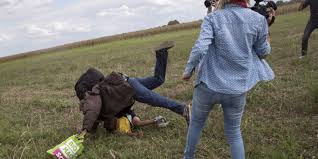Middle Eastern conflicts spill onto Spanish soccer pitch
By James M. Dorsey
Inevitably, the mass exodus of
refugees from conflict areas was going to provoke the spilling into Europe of
multiple disputes in the Middle East, Central Asia and Africa. Spanish soccer
is the first to feel the weight of the baggage that has turned vast numbers
into destitute refugees. Kurdish rebels have accused a Syrian coach who was hired
earlier this month by Real Madrid after having been tripped on camera by a
Hungarian camera woman as he was running towards the border a child in his arms
of being an Al Qaeda fighter and the instigator of a deadly anti-Kurdish soccer
brawl.
The allegations raised by the
Syrian Kurdish Democratic Union Party (PYD), believed to be associated with the
Kurdistan Workers Party (PKK) that is locked into escalating hostilities with
Turkey, are serious. PDY media asserted that Osama Abdul Mohsen, the coach who
landed in Spain, had been a fighter for Jabhat al Nusra, a major Syrian
jihadist militia aligned with Al Qaeda.
The PYD and a Syrian Christian
Facebook page charged further that Mr. Abdul Rahman had recently revived his
Facebook page but had deleted the Nusra flag which in the past had been his
cover photo. Also allegedly removed from the page were references to Mr. Abdul
Rahman having fought against Kurdish forces in Amudeh, Serekaniye and Afrin. “Osama
Abdul joined the rebel groups in 2011 and committed crimes against civilian
minorities, including Kurds,” the PYD said in a statement.
The PYD suggested further that
Mr. Abdul Rahman had left Syria on a journey that put him in the spotlight in
Hungary and propelled him to Spain after Kurdish forces captured in July the
Syrian town of Tel Abyad where he and his family lived.
Kurdish resentment of Mr. Abdul
Mohsen, who was the coach of al-Fotuwa SC in Deir Ez Zor from 2004-2010,
appears heightened by allegations that he was one of the instigators of a
soccer brawl in 2004 in the predominantly Kurdish city of Qamishli during which
Syrian security forces killed at least 50 Kurdish protesters.
The allegations raise serious
policy questions for European governments. An unknown number of refugees may
well have been fighters at some point in the past 4.5 years of groups that are
proscribed in the West. Some sources suggest that Mr. Abdul Rahman had been arrested
and tortured by forces loyal to Syrian president Bashar al-Assad early on in
the war.
Many may have felt they had no
choice in a brutal civil war rather than having opted to join groups like Nusra
for ideological reasons. That is all the more true in a situation in which
Western efforts to create more moderate rebel forces have failed miserably. The
failure has prompted efforts by Qatar to bring Nusra in from the cold and
sparked creeping suggestions in the West that Nusra in the fight against the
Islamic State may be the lesser of two evils.
To be sure, determining who is
who in the human mass that has swept on to the shores of Europe is no easy
feat, Nonetheless, the PDY allegations are likely to be grist on the mill of
East European opposition to accommodation of the refugees that is often laced
with racism and conservative and right-wing West European politicians and groups
with long-standing reservations about immigration.
Intelligence agencies have
further warned that some jihadists may slip into Europe with the refugees. German
intelligence said this week that the number of Islamic extremists in the
country had increased sharply in recent months and expressed concern that they
were recruiting among refugees.
There is no immediate way of
checking the PYD’s allegations, but both Syrian and Kurdish rebel groups as
well as the Assad regime have a vested interest in trying to stymie the exodus
from areas that they control. They both fear that their regions could be
depopulated and that their ability to recruit fighters would diminish.
The PYD is reported to have
barred Kurds in at least one area under its control, Efrin, from travelling to
Turkey, a gateway to Europe. A PDY rival, the Kurdish National Council (KNC) earlier
this month organised protests against migration in Hasakah province. KNC
officials said they feared Kurdish demands for autonomy, if not independence,
could be undermined by demographic changes as a result of an exodus of Kurds.
Similarly, the Assad regime opposes migration because it further undermines its
legitimacy.
Real Madrid and Mr. Abdul Rahman
have yet to comment on the allegations levied by the PYD. Irrespective of their
accuracy, the allegations raise multiple issues that go beyond security
considerations. Mr. Abdul Rahman hails from an environment that was tough even
before civil war erupted in Syria.
The more damning PYD assertion is
his alleged involvement in the soccer brawl that occurred long before the civil
war and was designed to suppress Kurdish demands for legitimate rights rather
than his association with Nusra in a situation in which people often have to
make difficult choices. Nonetheless, Mr. Abdul Rahman should also respond in
chapter and verse to his alleged association with Nusra.
The question, however, what if,
remains. Sending Mr. Abdul Rahman and his family back to Syria and retaliation
by either the rebels or the regime is not an option. The real lesson is that
refugees’ baggage is a mixed bag of the disputes that persuaded them to leave
their home countries as well as choices they made in conflict situations. It’s
easy to judge them from an armchair, but doesn’t solve the issue of what
consequences that judgement should have.
James M. Dorsey is a senior fellow at the S.
Rajaratnam School of International Studies as Nanyang Technological University
in Singapore, co-director of the Institute of Fan Culture of the University of
Würzburg and the author of the blog, The Turbulent World of Middle East Soccer, and a forthcoming book with the
same title.





Comments
Post a Comment